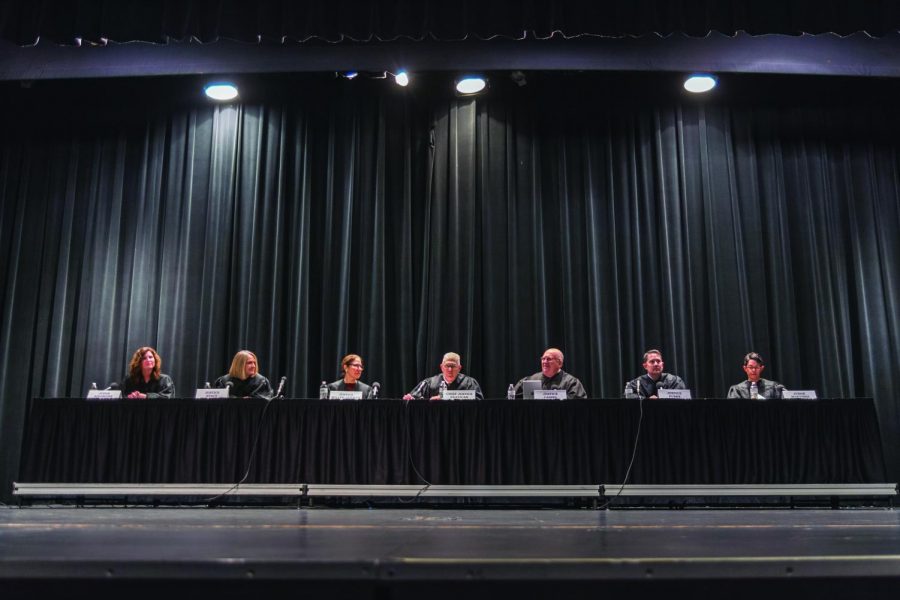Hear Ye, Hear Ye, MN is Now in Session
‘This is no longer an auditorium. This is now the Supreme Court.’
When the word “court” is imagined, a picture straight out of Judge Judy comes to mind: a big mahogany counter, a judge with a gavel, witnesses giving testimonies on either side of the room, and a jury in the corner deciding the fate of a criminal.
On April 5, students learned that this isn’t always the case. Through the Nebraska Supreme Court Community Outreach Program, MN was given the opportunity to witness the Nebraska Supreme Court argue a case. This opportunity was offered to a variety of classes including social studies, debate, journalism, and forensics
“About a year ago, I saw a story in the Omaha World-Herald about the NE Supreme Court holding arguments at another school in Omaha. I immediately wrote to them, telling them that Millard North would be honored to have this opportunity one day,” Principal Brian Begley said.
The event commenced with a presentation giving background about the Nebraska Supreme Court. Students learned that the Supreme Court is the last resort for cases in the state circuit of courts, which is separate from the federal circuit. Students also learned that the current NE Supreme Court contains five justices and two positions that were filled in for the case that day. County Judge Timothy Burns also spoke about the outreach program.
“The Outreach Program started to make students aware of what the court does. It’s crucial to expose the students to what they do and how the Supreme Court works,” Burns said.
After the speech, the students were given an overview of the case that was going to be argued: “Zelenka v. Pratte”. It was a case on possession of property after the breakup of a romantic relationship.
At approximately 1:35 p.m., the NE Supreme Court justices entered the auditorium.
“All rise. Hear ye, hear ye, court is now in session,” the bailiff said.
All the students and teachers in the auditorium stood as the justices filed into their seats. Then, Chief Justice Michael Heavican gave them the signal to sit down.
Ryan Lewis, the attorney for Jason Pratte, had ten minutes to present his case. Lewis gave a briefing of his case, and the justices asked him questions pertaining to his oral argument. The state Supreme Court does not listen to witness testimonials or any evidence presented.
“Technically the case has already been tried in the trial court below. What we are looking at is what happened in the trial court so we get the transcript and the testimonies. But when somebody isn’t happy with what happened at the trial court, cases come to us,” Judge Francie Riedmann said.
After Lewis’s ten minutes were up, Jill Mason, attorney for Peter Zelenka, had the chance to do the same.
The final verdict was not decided on the spot. The court will put out a written opinion of their verdict, stating the reason they chose the outcome they did.
The argument was followed by a Q&A session. The justices also spoke about the benefits of the outreach program as a whole.
“Ultimately, I think this experience is a really important one for students. They get to see that the seven of us are just seven ordinary people, citizens of Nebraska,” Justice Jeffry Funke said. “It gives them a chance to see we’re just like them, just a little farther in our journey than they are.”


